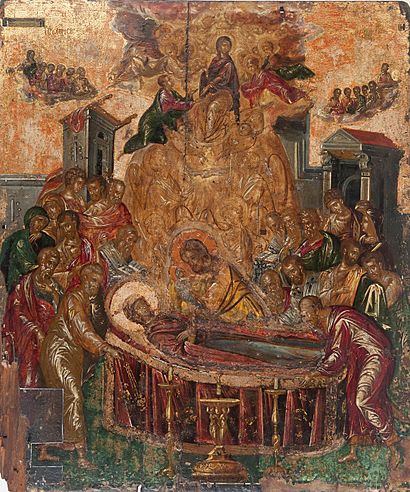Dormition of the Virgin (El Greco) facts for kids
Quick facts for kids The Dormition of the Virgin |
|
|---|---|
| Greek: Η κοίμηση της Θεοτόκου, Spanish : El tránsito de la Virgen | |
 |
|
| Artist | El Greco |
| Year | 1565–1566 |
| Type | Tempera and gold on panel |
| Movement | Cretan School |
| Dimensions | 61.4 cm × 45 cm (24.2 in × 18 in) |
| Location | Holy Cathedral of the Dormition of the Virgin, Hermoupolis |
The Dormition of the Virgin is a famous painting by the artist El Greco. He painted it around 1565 or 1566, towards the end of his time in Crete. This artwork is very important because it helped experts understand more about El Greco's early career.
In 1983, El Greco's signature was found on the painting. This discovery was a big deal! It helped art historians confirm that other paintings, like the Modena Triptych and The Adoration of the Magi, were also made by him. This meant they could learn more about how his style developed.
Contents
Understanding the Painting's Style
This painting mixes two main art styles. It combines elements from the Cretan School, which was popular where El Greco grew up, with Mannerism. Mannerism was an Italian art style.
El Greco grew up on the island of Crete. He learned a lot about art there. This painting shows how he started to combine what he learned in Crete with new ideas from Italy. He later moved to Venice and then Rome, where he developed his unique style even more.
The Icon's Special Role
This painting is also an icon. An icon is a religious image that people use for prayer and worship. This specific icon is still used today in the Church of the Dormition of the Virgin in Syros, Greece.
It was likely brought to the island during the Greek War of Independence. The painting follows the traditional way of showing the "Dormition" (which means "falling asleep" or "death" of the Virgin Mary). This was a common theme in the Orthodox Church, where El Greco was raised. However, El Greco added some new touches, making it less strict and more like the art of the Renaissance.
Connecting to Other Works
Some art experts believe that The Dormition of the Virgin influenced another famous painting by El Greco, called Burial of the Count of Orgaz. They think the way El Greco arranged the figures in the "Dormition" icon might have inspired the later work.
Experts like Marina Lambraki-Plaka and Robert Byron have studied this connection. They suggest that El Greco often reused ideas and designs from his earlier works. He would adapt them to fit the story and feelings he wanted to show in his art.
See also
 In Spanish: Tránsito de la Virgen (El Greco) para niños
In Spanish: Tránsito de la Virgen (El Greco) para niños
- List of works by El Greco
- Cretan School

